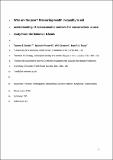Who are the poor? Measuring wealth inequality to aid understanding of socioeconomic contexts for conservation : a case study from the Solomon Islands
Abstract
Understanding the local socioeconomic context is important for the design of appropriate conservation initiatives and associated monitoring strategies, especially in areas with high degrees of inequality, to ensure conservation interventions do not inadvertently further disadvantage vulnerable people. Typical assessments of wealth inequality in remote rural areas are constrained by limited engagement with a cash economy, complex family and tribal ties, and an absence of basic infrastructure. This paper presents a simple participatory approach to measure wealth inequality that does not predefine indicators, such as income or assets, but allows the local people choose the most appropriate indicators. A case study from the Solomon Islands revealed poor households in Kahua were characterized by fewer members, fewer members of working age, and fewer male members than wealthier households. The poor also owned fewer of the locally defined indicators of wealth that were collectively correlated with limited land tenure, and, consequently, conservation or development initiatives that are tied to land in Kahua will be less likely to assist the poorest. Adopting this participatory approach could improve the effectiveness of community-based conservation, through facilitating opportunities to explore local poverty and routes for alleviation.
Citation
Davies , T E , Pettorelli , N , Cresswell , W & Fazey , I R A 2014 , ' Who are the poor? Measuring wealth inequality to aid understanding of socioeconomic contexts for conservation : a case study from the Solomon Islands ' , Environmental Conservation , vol. 41 , no. 4 , pp. 357-366 . https://doi.org/10.1017/S0376892914000058
Publication
Environmental Conservation
Status
Peer reviewed
ISSN
0376-8929Type
Journal article
Description
TD was supported by a Natural Environment Research Council studentship (DTG: AGS6-NERC10). Additional funding for fieldwork was provided by Chester Zoo and Rufford Small Grants (11022-1) Date of Acceptance: 30/01/2014Collections
Items in the St Andrews Research Repository are protected by copyright, with all rights reserved, unless otherwise indicated.

